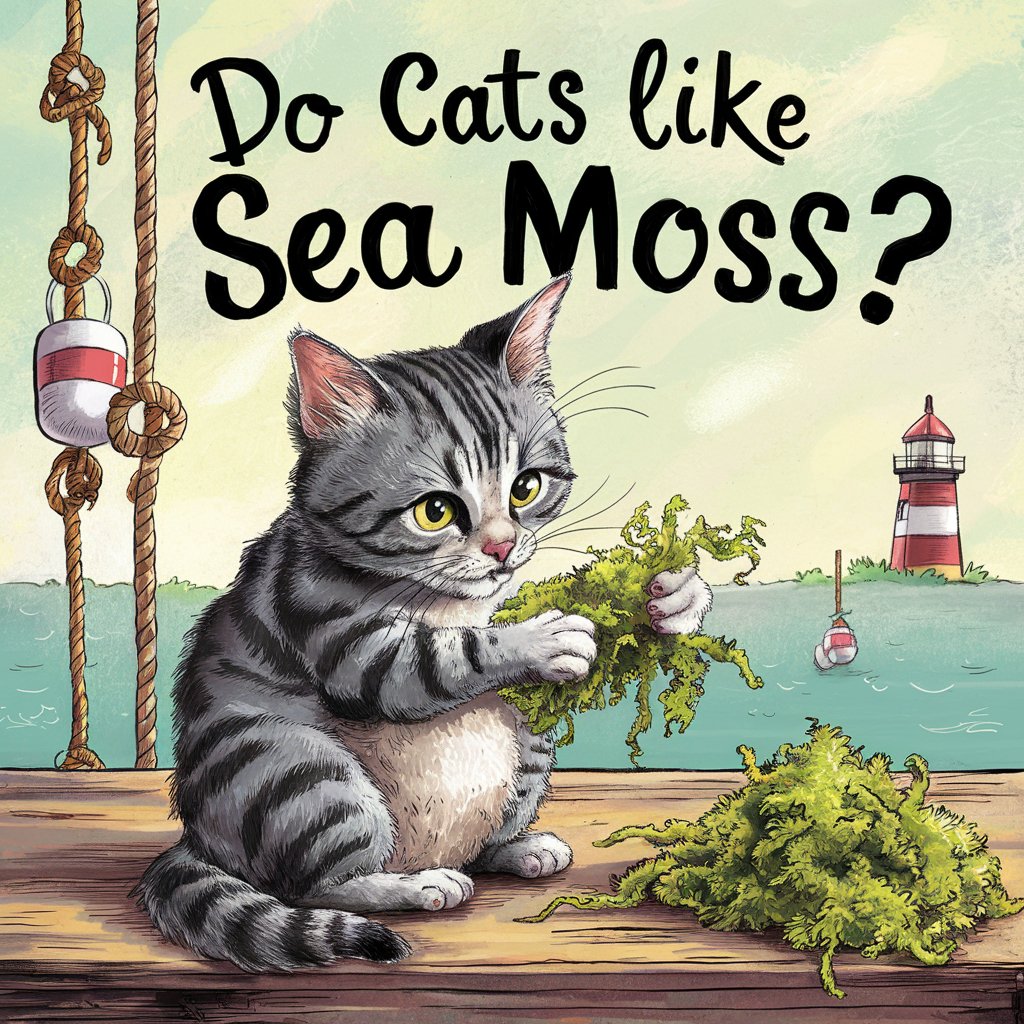
Do Cats Like Sea Moss?
What is Sea Moss?
Origin and Types of Sea Moss
Sea moss, often referred to as Irish moss, is a type of red algae that grows along the rocky coasts of the Atlantic. It comes in different colors, such as green, yellow, and purple, each with its unique nutrient profile. Sea moss has been used in human diets for centuries, particularly in Caribbean and Irish cultures.
Nutritional Value of Sea Moss
Packed with essential nutrients like iodine, calcium, potassium, and vitamins A, E, and K, sea moss is often praised for its health benefits. These nutrients are crucial for maintaining overall well-being, which is why sea moss has become a popular supplement in recent years.

Do Cats Like Sea Moss?
Natural Preferences of Cats
Cats are obligate carnivores, meaning they thrive on a diet primarily made up of meat. Naturally, they prefer foods rich in protein and fats, which makes them less likely to seek out plant-based options like sea moss. So, do cats like sea moss? The answer varies, but many cats might not be naturally drawn to it.
Anecdotal Evidence from Cat Owners
Some cat owners have noticed their cats showing interest in sea moss, especially when it’s mixed with their usual food. However, this interest isn’t universal. While some cats might nibble on food containing sea moss, others might completely ignore it.
Expert Opinions on Cats and Sea Moss
Experts believe that while cats might not instinctively go for sea moss, it can be introduced into their diet in small amounts. The key is to ensure that sea moss is added in a way that complements their nutritional needs without overwhelming their taste preferences.
Is Sea Moss Safe for Cats?
Potential Benefits of Sea Moss for Cats
Sea moss could offer some potential benefits for cats, such as supporting thyroid health due to its iodine content, and providing a range of vitamins and minerals that may boost their overall health. But, is it enough to make them like sea moss? That’s up for debate.
Possible Risks and Side Effects
While sea moss is generally considered safe in small quantities, too much iodine can lead to thyroid issues in cats. Some cats might also experience digestive problems if introduced to sea moss too quickly. To minimize these risks, it’s crucial to introduce sea moss gradually and in moderation.
Recommendations from Veterinarians
Veterinarians often recommend introducing any new food, including sea moss, with caution. If you’re asking, “Do cats like sea moss enough to eat it regularly?” contact your vet, if your cat has any health concerns.

How to Introduce Sea Moss to Your Cat’s Diet
Choosing the Right Type of Sea Moss
When adding sea moss to your cat’s diet, it’s important to choose high-quality, organic options. Sea moss gel is easier to mix with cat food and might be more palatable than dried sea moss, which can be tough and unappealing.
Proper Preparation and Dosage
Start by adding a small amount, such as half a teaspoon of sea moss gel, to your cat’s food. Gradually increase the amount if your cat seems to tolerate it well. This cautious approach can help you gauge whether your cat might like sea moss over time.
Monitoring Your Cat’s Reaction
After introducing sea moss, keep an eye on your cat’s behavior and health. Watch for any signs of digestive upset or allergies, such as vomiting, diarrhea, or itching. If your cat shows any adverse reactions, it might be a sign that they don’t like sea moss or that it doesn’t agree with them.
Alternatives to Sea Moss for Cats
Other Marine-Based Supplements
If your cat doesn’t seem to like sea moss, there are other marine-based supplements to consider. Fish oil, for example, is rich in omega-3 fatty acids and is often more appealing to cats due to its fishy flavor.
Herbal and Plant-Based Alternatives
For those looking for plant-based options, catnip or cat grass might be more attractive to your cat. These alternatives are natural choices that many cats enjoy, and they also offer some health benefits.

Benefits of Sea Moss for Pets
General Benefits for Pets
Sea moss is believed to support skin health, enhance the immune system, and improve joint function. While these benefits are well-documented in humans, their effects on pets, including cats, are still being explored.
Comparison with Other Supplements
Compared to other supplements, sea moss provides a wide range of nutrients. However, whether cats like sea moss as much as they do other supplements like fish oil or chicken-based products remains uncertain.
Common Misconceptions about Sea Moss
Debunking Myths
A common myth is that sea moss can cure various health issues in pets. While it’s true that sea moss is nutritious, it’s not a miracle cure. It’s better to use it as a supplement, not a substitute for a balanced diet.
What Research Says
Current research on sea moss and its effects on cats is limited. While it’s clear that sea moss is nutrient-rich, whether cats like sea moss and benefit from it as much as humans do is still not well-established.
Personal Stories from Cat Owners
Experiences of Introducing Sea Moss
Some cat owners have had success introducing sea moss into their cats’ diets, noting improvements in their pets’ coats and energy levels. However, these changes can be subtle, and not all cats like sea moss enough to eat it regularly.
Changes Observed in Cats
When cats do accept sea moss, some owners report shinier fur and increased vitality. However, these benefits are usually gradual and may take time to notice.

Expert Opinions on Sea Moss and Pets
Insights from Veterinarians and Pet Nutritionists
Veterinarians and pet nutritionists generally agree that while sea moss can be a healthy addition to a pet’s diet, it should be given in moderation. They also emphasize the importance of observing your cat’s reaction to see if they like sea moss.
Studies on Sea Moss and Its Effects on Animals
Few studies have directly examined how sea moss affects pets, so the question of whether cats like sea moss remains largely anecdotal. More research is needed to confirm its benefits and potential drawbacks for cats.
Final Thoughts: Do Cats Like Sea Moss?
So, do cats like sea moss? The answer isn’t straightforward. While some cats might tolerate or even enjoy it in small amounts, others might not be interested at all. As with any new food, it’s essential to introduce sea moss slowly and observe your cat’s reaction. Always consult with your vet to ensure that any dietary changes are safe and beneficial for your furry friend.

FAQs: Do Cats Like Sea Moss?
Can Sea Moss Be Toxic to Cats?
In small, controlled amounts, sea moss is not toxic to cats. However, too much could lead to health issues, particularly related to iodine levels.
How Often Should I Feed Sea Moss to My Cat?
If you decide to feed your cat sea moss, start with once or twice a week in very small quantities. This allows you to monitor whether your cat likes sea moss and how their body responds to it.
What Are the Signs of Sea Moss Allergy in Cats?
Allergic reactions in cats can include vomiting, diarrhea, and itching. If your cat exhibits any of these symptoms after eating sea moss, it’s best to discontinue use and consult your vet.
Is Sea Moss Suitable for All Cats?
Not all cats will like sea moss, and it may not be suitable for those with certain health conditions, particularly thyroid issues. Always consult with a veterinarian before adding sea moss to your cat’s diet.
Can Kittens Eat Sea Moss?
Kittens have sensitive digestive systems, so it’s better to wait until they are older before introducing sea moss or any new supplement.
Is Eucalyptus Safe for Cats?

I am a dedicated writer and expert in cats, with years of experience studying feline behavior, health, and breeds. Passionate about sharing my knowledge, I provide valuable insights and practical advice to help cat lovers understand and care for their furry companions. When not writing, I enjoy spending time with my beloved cats, continually learning and deepening my expertise.

Leave a Reply